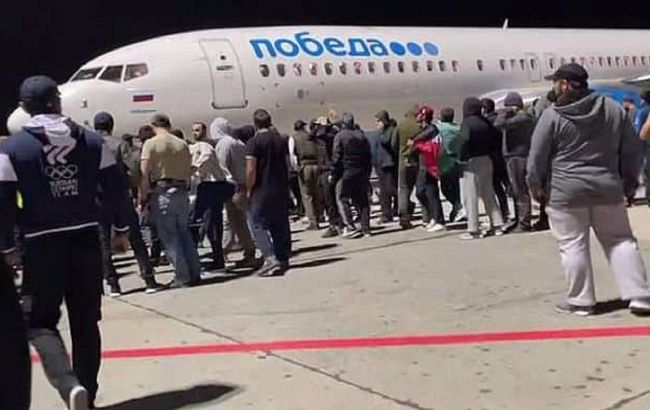Ukrainian expert assessed possibility of further aggression outbreaks in Russia, as in Makhachkala
 Participants of the "seizure" of the airport in Makhachkala (Photo: screenshot from the video)
Participants of the "seizure" of the airport in Makhachkala (Photo: screenshot from the video)
After the anti-Israeli riots in Makhachkala, further outbreaks of aggression are possible in Russia. However, they may manifest differently, said political analyst Volodymyr Fesenko to RBC-Ukraine.
The expert believes that what happened on Sunday evening in the capital of Dagestan (Russia) was most likely a spontaneous event but "far from accidental."
"This is a consequence of the aggressive state of Russian society fueled by the war against Ukraine. Previously, it manifested itself during the June coup attempt by the Wagner PMC (Private Military Company) and in some other forms," he said.
Fesenko considers the Russian region of Dagestan a potential hot spot.
It is one of the poorest regions, ethnically diverse, with numerous social problems and a high level of Islamic radicalism, noted the expert.
According to him, if Russian propaganda tried to use the Israel-Hamas conflict to redirect aggression towards the West, radical Islamists of the North Caucasus, who have "natural" anti-Semitism, defined their target.
"Information appeared about an alleged refugee plane from Israel. And that spark led to a significant fire. This is an element of one chain because anti-Israel hysteria has existed on Russian TV, albeit indirectly, sympathies for Hamas and a critical attitude toward Israel were not hidden. Different forms of anti-Semitism were expressed by Putin and Lavrov (Russian Minister of Foreign Affairs), especially on TV and in Telegram channels. Thus, the groundwork for the spontaneous seizure of the airport and 'hooliganism' existed," expressed Fesenko in his conversation with the publication.
He also noted that the current war in the Middle East has only become an external trigger for Dagestan.
"The continuation in Russia will probably be in different forms and places. Because the internal aggression, which is now mostly directed against Ukraine, will eventually lead to an explosion in Russia itself," said the political analyst.
According to Fesenko, the "unrest" in Russia corresponds to Ukraine's interests, although provoking a revolution from the outside is impossible without internal preconditions.
The expert added that the possible influence of the aforementioned Telegram channel on the events in Makhachkala was minimal, as the necessary moods and aggression in Russia were already present.
Makhachkala pogrom
Recall that on Sunday evening, October 29, an enraged crowd of Dagestanis stormed the airport in Makhachkala. They were looking for Jews who supposedly arrived on a flight from Israel. Later, it became known that over 20 people were affected by the pogrom.
Ukrainian President Volodymyr Zelenskyy stated that the events in Makhachkala are part of the widespread culture of hatred toward other nations in Russia.
The Institute for the Study of War noted that due to this situation, it becomes increasingly difficult for the Kremlin to create an illusion for voters that Russia is a religiously tolerant country.
Secretary of the National Security and Defense Council of Ukraine Oleksiy Danilov also reacted to the situation. The official predicts that anti-Israeli spontaneous actions and pogroms are likely to occur in other cities and regions of Russia.
The representative of the Russian Foreign Ministry, Maria Zakharova, stated that the pogroms supposedly resulted from a "planned and externally executed provocation," where the Kyiv regime played the critical role.
The U.S. State Department called such accusations by the Russians against Ukraine absurd.

